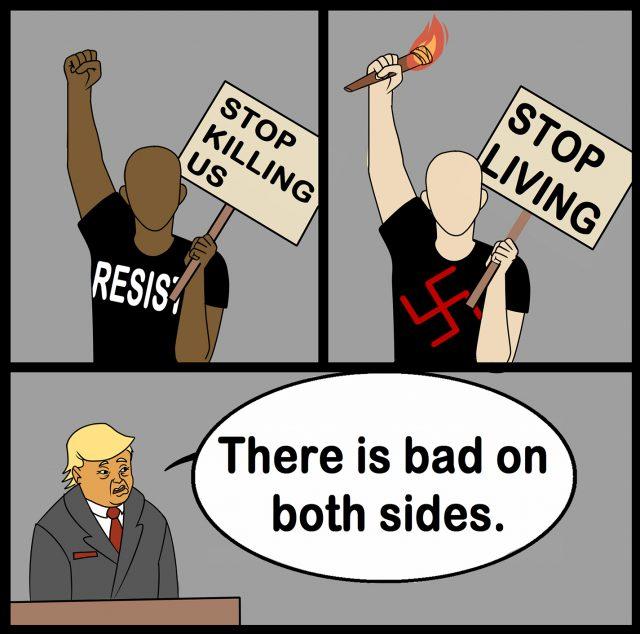President Donald Trump signed a congressional resolution condemning white supremacy Sept. 14 hours after once again defending his assertion that both sides in Charlottesville, Virginia, last month had “bad dudes.”
The resolution, passed by both the House and Senate earlier in the week, condemns “the violence and domestic terrorist attack that took place” in Charlottesville. The resolution also condemns white supremacists, neo-Nazis and other hate groups.
More importantly, though, it urges the Trump administration to speak out against the hate groups that advocate anti-Semitism, white supremacy, xenophobia, racism and extremism. Though he did sign the resolution and made a statement condemning the violence in Charlottesville and hatred and bigotry in all forms, it lacked sincerity.
Hours earlier, while flying home from Florida after visiting areas affected by Hurricane Irma, Trump told reporters on Air Force One, “You know, you have some pretty bad dudes on the other side also,” reported Fox News.
This makes signing the congressional resolution hours later seem hollow because Trump had just once again supported the idea that racists and Nazis were the same as people fighting for equality.
But the bigger focus here should be why did it take a congressional resolution to get the president of the United States to even insincerely, kind of condemn white supremacists?
In short, it’s because Trump benefits from every facet of hate. It was clear during his run for the presidency, and it remains clear as he continues to go back and forth on his stance regarding white supremacy even in the wake of a domestic terrorist attack carried out by white supremacists.
In preparation for his presidential run, Trump recognized the power hate groups have and became very involved in the “birther” controversy, the movement that spread the conspiracy theory that former President Barack Obama was not born in the U.S.
By involving himself with that movement, Trump had established credibility with racist groups, xenophobes and Islamophobes by the time he announced his run for president.
To them, his promise to “Make America Great Again” was understood as a pledge to restore the racist and patriarchal order that the American people have been attempting to do away with since the Civil Rights Movement in the ‘60s.
The prevalence of hate groups now shaping American politics should not be shocking. Their demands were looped into Trump’s agenda from the start, and the president continues striving to deliver on the promises he made them. It’s why he’s tied to so many white supremacists like Steve Bannon and Joe Arpaio.
Trump will not distance himself from the alt-right. He can’t. If he did, what little support he still has would be gone, and he’s shown more than once how stubborn and egotistical he is. The possibility of him apologizing, changing positions and sincerely disavowing white supremacy is as likely as seeing a unicorn running through a TCC parking lot.
However, American citizens should continue to fight for equality and not let the issue go. Americans should continue to pressure Trump as well as other alt-right politicians to truly and sincerely condemn hate and bigotry in all forms once and for all.































